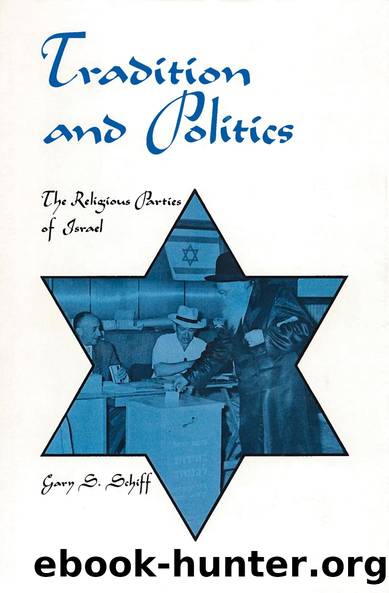Tradition and Politics by Gary S Schiff

Author:Gary S Schiff [Schiff, Gary S]
Language: eng
Format: epub
Tags: Literary Criticism, Subjects & Themes, Politics, Religion, Judaism, History, Middle East, Israel & Palestine
ISBN: 9780814343906
Google: 65ZwDwAAQBAJ
Publisher: Wayne State University Press
Published: 2018-02-05T15:59:43+00:00
Part III
The Parties in the System
Chapter 6
Mafdal and the Nationalization of Religion
With the establishment of the state in 1948, the major task for the Mizrahi and ha-Poâel ha-Mizrahi parties was the nationalization of religion. The former Kneset Yisrael religious structures and procedures were to be absorbed into the institutional and fiscal network of the new state, with full recognition and extension of their powers, and new structures and arrangements would have to be established to satisfy unmet needs. The process of nationalization was facilitated by the colonization or domination of these institutions by Mafdal.
Where possible, the nationalization was accomplished by the enactment of appropriate legislation. Elsewhere it depended on less formal arrangements, collectively referred to as the status quo. Mizrahi and ha-Poâel ha-Mizrahi (later Mafdal), true to their traditional pattern of behavior, accomplished the goals incrementally, deftly exploiting their pivotal coalition position as the most convenient partner for Mapai-Labor. Nevertheless, despite its long-standing domination of the religious establishmentâwhich had been granted it by Mapai in return for its support in other areasâMafdal has recently met with an increasingly effective challenge to and penetration of its position by Mapai-Labor itself, the dominant party in Israel.
The Ministry of Religions
The key tool in, and indeed itself a prime example of, the nationalization of religion in Israel is the Ministry of Religions (Misrad ha-Datot). Mizrahi and ha-Poâel ha-Mizrahi realized that to strengthen and expand the role of official religion, an institutional basis would have to serve as the focal point for its domination of the religious establishment. Thus, they insisted upon the immediate establishment of such a ministry.1 (The Ben-Gurion government was also under external pressure from non-Jewish international religious bodies and states with interests in the Holy Land to set up such a ministry.) This was, in fact, decreed by the Provisional Council in 1948, and Mizrahi and ha-Poâel ha-Mizrahi (later Mafdal) have held the portfolio except in the period 1958â61 and briefly in the post-1973-war Meir and Rabin governments. The minister has been a top party leader (e.g., Maimon, Shapira, Warhaftig, Refael), and the large majority of the ministryâs officials and appointees are Mafdal members. Clearly, Mafdal attaches great importance to the ministry.
The significance of the Ministry of Religions for Mafdal is threefold. On the first level are the largely administrative, supervisory (and less political) powers over and technical services for all the various religious sects in Israel. Such tasks, inherited from the mandatory government, have since been expanded. In the dominant Jewish community, the ministry, along with the chief rabbinate, supervises the kashrut of those public institutions not under the supervision of the local rabbinate and of imported foodstuffs, especially meat. It participates in the financing of the building of synagogues and mikvaâot; distributes religious articles and literature to synagogues, institutions and needy individuals; supervises the activities of burial societies; administers holy sites, notably the Western Wall; fosters the development of yeshivot; and in general promotes religious life. It also handles the administrative and financial affairs of the rabbinical courts and of the chief rabbinate.
Download
This site does not store any files on its server. We only index and link to content provided by other sites. Please contact the content providers to delete copyright contents if any and email us, we'll remove relevant links or contents immediately.
4 3 2 1: A Novel by Paul Auster(12359)
The handmaid's tale by Margaret Atwood(7737)
Giovanni's Room by James Baldwin(7308)
Asking the Right Questions: A Guide to Critical Thinking by M. Neil Browne & Stuart M. Keeley(5745)
Big Magic: Creative Living Beyond Fear by Elizabeth Gilbert(5731)
Ego Is the Enemy by Ryan Holiday(5400)
The Body: A Guide for Occupants by Bill Bryson(5067)
On Writing A Memoir of the Craft by Stephen King(4923)
Ken Follett - World without end by Ken Follett(4712)
Adulting by Kelly Williams Brown(4557)
Bluets by Maggie Nelson(4539)
Eat That Frog! by Brian Tracy(4505)
Guilty Pleasures by Laurell K Hamilton(4430)
The Poetry of Pablo Neruda by Pablo Neruda(4084)
Alive: The Story of the Andes Survivors by Piers Paul Read(4013)
White Noise - A Novel by Don DeLillo(3997)
Fingerprints of the Gods by Graham Hancock(3981)
The Book of Joy by Dalai Lama(3964)
The Bookshop by Penelope Fitzgerald(3831)
